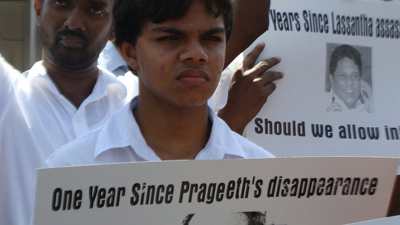In recent years, January has emerged as Sri Lanka’s cruelest month for journalists. To commemorate that ugly fact, 100 journalists and press freedom activists gathered Tuesday outside the Fort Railway Station in the capital, Colombo, demanding that the government expedite investigations into a series of attacks and January killings that occurred in both 2009 and 2010.
Sri Lanka is notorious for impunity in anti-press attacks. It is the fourth worst country in the world in terms of unsolved journalist murders, according to CPJ’s Impunity Index.
The string of brutalities under protest in Colombo date back to January 2009. That year, on January 6, the independent Sirasa TV’s studios were bombed in an early-morning raid carried out with “military precision,” according to staffers on hand at the time. Two days later, on January 8, Lasantha Wickramatunga was killed by eight motorcycle-riding men wielding wooden and metal poles. And on January 23, Upali Tennakoon, editor of the Sinhala-language, pro-government weekly Rivira and his wife, Dhammika were driving to his office when motorcyclists intercepted their car and smashed its window in an attack similar to that which killed Wickramatunga. The Tennakoons escaped (although Upali was heavily scarred), and they now live in exile in the United States. CPJ documented those attacks in our February 2009 special report “Failure to investigate.”
None of the cases have been solved, and no one has been brought to justice.
Explosions, murder, assaults, and exile are cruel fates, but what happened to Prageeth Eknelygoda might even be worse, at least for his wife Sandhya and their two teenage sons. He has simply disappeared. A mild-mannered political cartoonist and columnist who supported the now-jailed opposition leader Sareth Fonseka, Eknelygoda has not been seen by his family or colleagues since he left for work at the pro-opposition news website Lanka eNews on January 24, 2010. CPJ documented Ekenelygoda’s case and the lack of follow up in the January 2009 cases in another special report, “In Sri Lanka, no peace dividend for the press,” in May 2010.
After authorities ignored appeals for help in locating her husband, Sandhya Eknelygoda issued a public letter in December that pleaded for information. It is a plea that no government institution–the police, the attorney general’s office, the government’s ostensibly independent human rights’ courts, or parliament–has adequately addressed. Sandhya Eknelygoda played a prominent role in the demonstration in Colombo on Tuesday.
CPJ Journalist Assistance Coordinator
